Local
Growing number of care providers catering to LGBTQ seniors
SAGE highlights unique needs of community at Virginia event

An event scheduled for Nov. 17 in Sterling, Va., described as ‘Giving Thanks to LGBTQ+ Elders: SAGE Table’ was expected to draw attention to the growing number of organizations and senior care facilities in Northern Virginia and in the D.C. metro area in general that are supportive of LGBTQ seniors.
The New York City-based national LGBTQ seniors advocacy group SAGE launched what it called SAGE Tables in 2017 as a gathering to share a meal among people of all ages to support their LGBTQ friends and family members who are seniors, in part, to alleviate social isolation.
SAGE has said hundreds of such gatherings have taken place across the country since SAGE Table events began.
The Sterling, Va., SAGE Table event was being co-hosted by five Northern Virginia-based senior care organizations or facilities that are welcoming to LGBTQ seniors, according to Karen McPhail, the CEO of Eldementals, LLC, one of the senior care providers hosting the event.
McPhail is also the founder and director of Aging Rainbows, a Great Falls, Va.-based group that advocates for LGBTQ seniors, and which is also one of the five co-hosts of the SAGE Table event in Sterling.
The other co-hosts include Insight Memory Care, a seniors care facility in Sterling where the SAGE Table event was to be held; Care Connect Nova of Purcellville, Va., a lesbian-owned company that provides in-home concierge senior care services in all parts of Northern Virginia; and Retirement Unlimited, Inc. (RUI), a Richmond, Va.-based company that provides both independent and assisted living residential facilities for seniors in Northern Virginia.
“Come enjoy an evening of dining and conversation,” a statement released by organizers of the Sterling SAGE Table event says. “SAGE Table events bring together people of all ages to share a meal and conversation,” it says. “The transformative relationships formed around a SAGE Table can alleviate social isolation and its consequences.”
McPhail said that while the senior care operators co-hosting the SAGE Table, including her company, are supportive and knowledgeable of the needs of LGBTQ seniors, not all such facilities have that knowledge and provide that support. She said she was prompted to form Aging Rainbows after witnessing first-hand inappropriate treatment toward one of her clients who is transgender.
“One of my transgender clients fell,” McPhail said. “She had a neck fracture. She had been doing well, independent, no problems before the fall,” McPhail told the Blade. “She is 63 years old and all of a sudden, she’s going to skilled nursing rehab. And they wanted to put her in a gender inappropriate room,” McPhail continued.
“And it took me hours of shielding her from what I thought was inappropriate, and educating and advocating to find the appropriate room,” she said. “I had to work over weeks to educate people who had no idea of her needs. And at that point, I sat down at my desk and said, enough. So, I created at that time all the information for starting Aging Rainbows.”
Among other things, McPhail said, Aging Rainbows advises senior care facilities she works with to enroll employees and officials in an LGBTQ competency training program operated nationally by SAGE. The facilities and organization participating in the program, called SAGECare, are designated “SAGECare credentialed” and are included in SAGE database lists available to LGBTQ elders looking for a safe and supportive facility in which to reside.
“It is the case now that in almost all states there are one or more elder care facilities that have been trained throughout our SAGECare program,” SAGE CEO Michael Adams told the Blade in a recent interview. “But it’s nowhere near where it needs to be,” he said. “It needs to be that there are welcoming elder care facilities in every single community in this country” for LGBTQ elders.
Insight Memory Care and Eldementals are SAGECare Platinum credentialed, according to SAGE spokesperson Christina Da Costa.
Da Costa told the Blade this week that there are currently 17 SAGECare credentialed organizations or facilities in the D.C. metro area. Among them is the Ingleside at Rock Creek residential seniors facility in D.C.
Under the SAGECare program, there are now 174,699 professionals trained and 748 SAGECare credentialed organizations or facilities nationwide, Da Costa said.
As of one year ago, SAGE said there were 15 elder care residential facilities in the U.S. created specifically to serve LGBTQ seniors. They are located in several of the nation’s large cities, including New York, San Francisco, and Los Angeles. But none are located in D.C., Virginia or Maryland.
Aging Rainbows, meanwhile, is among several D.C.-area organizations that provide support and services for LGBTQ seniors. The D.C. Center for the LGBT Community and Whitman-Walker Health, D.C.’s LGBTQ supportive healthcare center, have provided programs and services for LGBTQ seniors for more than a decade.
Among the regular events offered by Center Aging, the D.C. Center’s seniors program are its weekly Monday morning Coffee and Conversation gathering and its weekly Friday afternoon Tea Time gathering. Both are currently held via Zoom.
As part of its ongoing special events, the Center Aging program held an event on Saturday, July 21 called Intergenerational Hangout in which LGBTQ older adults and LGBTQ younger adults came together for a discussion about “everything and anything in the hopes of building bridges between generations and providing some laughs along the way,” according to a D.C. Center announcement of the event.
Abby Fenton, a spokesperson for Whitman-Walker Health, said the LGBTQ supportive health center has long provided supportive and affirming medical care for LGBTQ seniors who make up a large number of its patients.
Fenton said “quite a few” of Whitman-Walker’s LGBTQ seniors patients are longtime HIV survivors who feel comfortable coming to a healthcare provider with expertise and understanding of how best to keep people with HIV healthy.
Whitman-Walker Health also co-coordinates at least four peer-led support groups for LGBTQ seniors called Silver Circles, that meet once a week, according to Michael Mitchell, the Whitman-Walker coordinator of the Silver Circles program. Mitchell said the program is operated jointly by Whitman-Walker and Iona Senior Services, a D.C.-based nonprofit organization that provides services for seniors, including LGBTQ seniors.
“Iona is proud to offer programs specifically created for LGBTQ older adults, in addition to our other programs that are open to everyone, regardless of sexual orientation or gender expression,” Iona says on its website.
Mitchell said the Silver Circles groups discuss a wide range of issues of interest to LGBTQ seniors, including the subject of sex.
He said the program is supported financially by the D.C. Department of Aging and Community Living, which lists on its website community-based organizations, including Whitman-Walker, Iona, and the D.C. Center that provide services for LGBTQ seniors.
Also providing support and services for LGBTQ seniors is Capitol Hill Village, a nonprofit organization serving older adults in Capitol Hill and surrounding neighborhoods, a statement on organization’s website says. The statement says the group’s focus is on helping seniors “age in place” in their own homes by providing services from its volunteers such as home maintenance and transportation.
Like the D.C. Center’s LGBTQ seniors gathering events on Mondays and Fridays, Mitchell said all the Silver Circle gatherings continue to meet virtually via Zoom.
Longtime D.C. LGBTQ seniors advocate Ron Swanda said he is disappointed that the D.C. Center’s seniors gatherings as well as other local seniors events have continued to meet virtually.
“I’d rather do these things face to face because I learn better and I like to get the feel for the people involved,” he said. “When I do it online I don’t,” said Swanda, who told the Blade he has withdrawn from participating in most Zoom events.
Mitchell of Whitman-Walker said that although participants in the LGBTQ seniors programs yearn for the pre-COVID, in-person gatherings, most have adjusted to the Zoom meetings, and some prefer them.
“Initially, we were concerned that our senior Circle folks wouldn’t necessarily get the technology,” Mitchell said in referring to the use of online programs like Zoom. “But they’ve glommed onto the technology pretty quickly,” he said.
“And what we have found is that they do miss meeting in person, as isolation is one of the things we’re trying to tackle, but not having to come downtown, find parking, be out after dark, be on icy sidewalks in the winter, that kind of thing has actually been very helpful for a lot of these folks,” according to Mitchell.
Maryland
Expanded PrEP access among FreeState Justice’s 2026 legislative priorities
Maryland General Assembly opened on Jan. 14
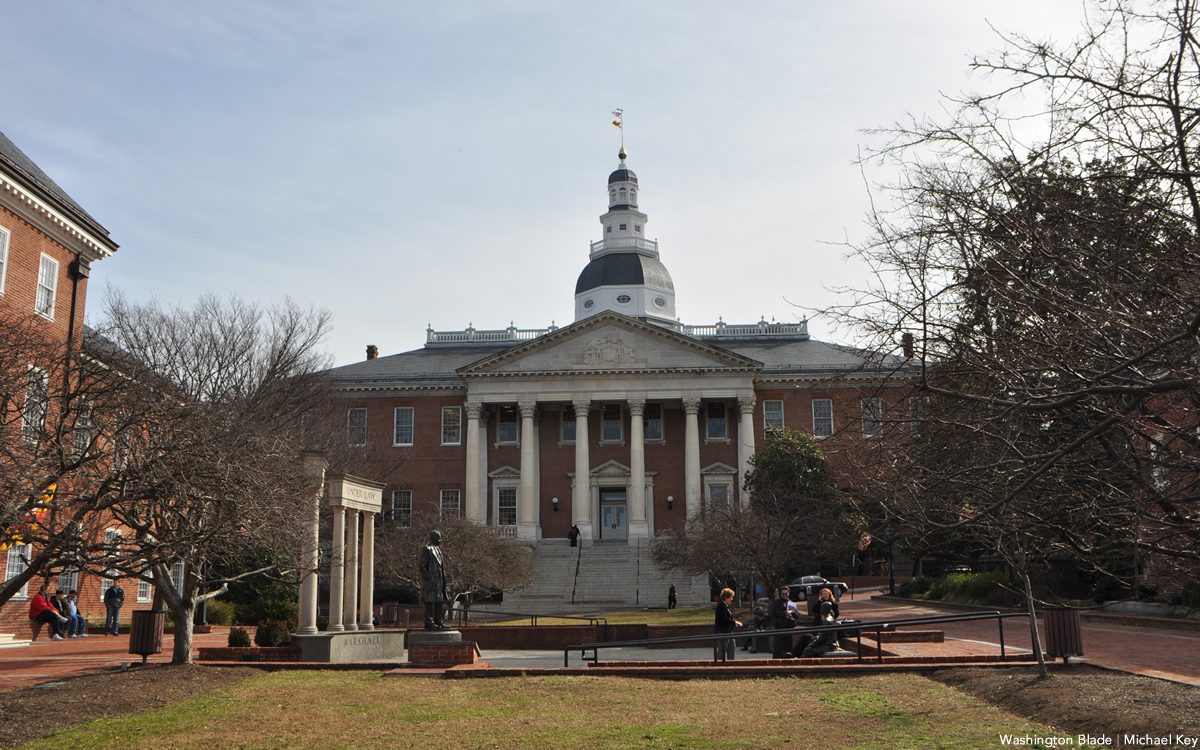
FreeState Justice this week spoke with the Washington Blade about their priorities during this year’s legislative session in Annapolis that began on Jan. 14.
Ronnie L. Taylor, the group’s community director, on Wednesday said the organization continues to fight against discrimination against people with HIV/AIDS. FreeState Justice is specifically championing a bill in the General Assembly that would expand access to PrEP in Maryland.
Taylor said FreeState Justice is working with state Del. Ashanti Martinez (D-Prince George’s County) and state Sen. Clarence Lam (D-Arundel and Howard Counties) on a bill that would expand the “scope of practice for pharmacists in Maryland to distribute PrEP.” The measure does not have a title or a number, but FreeState Justice expects it will have both in the coming weeks.
FreeState Justice has long been involved in the fight to end the criminalization of HIV in the state.
Governor Wes Moore last year signed House Bill 39, which decriminalized HIV in Maryland.
The bill — the Carlton R. Smith Jr. HIV Modernization Act — is named after Carlton Smith, a long-time LGBTQ activist known as the “mayor” of Baltimore’s Mount Vernon neighborhood who died in 2024. FreeState Justice said Marylanders prosecuted under Maryland Health-General Code § 18-601.1 have already seen their convictions expunged.
Taylor said FreeState Justice will continue to “oppose anti anti-LGBTQ legislation” in the General Assembly. Their website later this week will publish a bill tracker.
The General Assembly’s legislative session is expected to end on April 13.
Virginia
From the Pentagon to politics, Bree Fram fighting for LGBTQ rights
Transgender veteran running for Congress in Va.
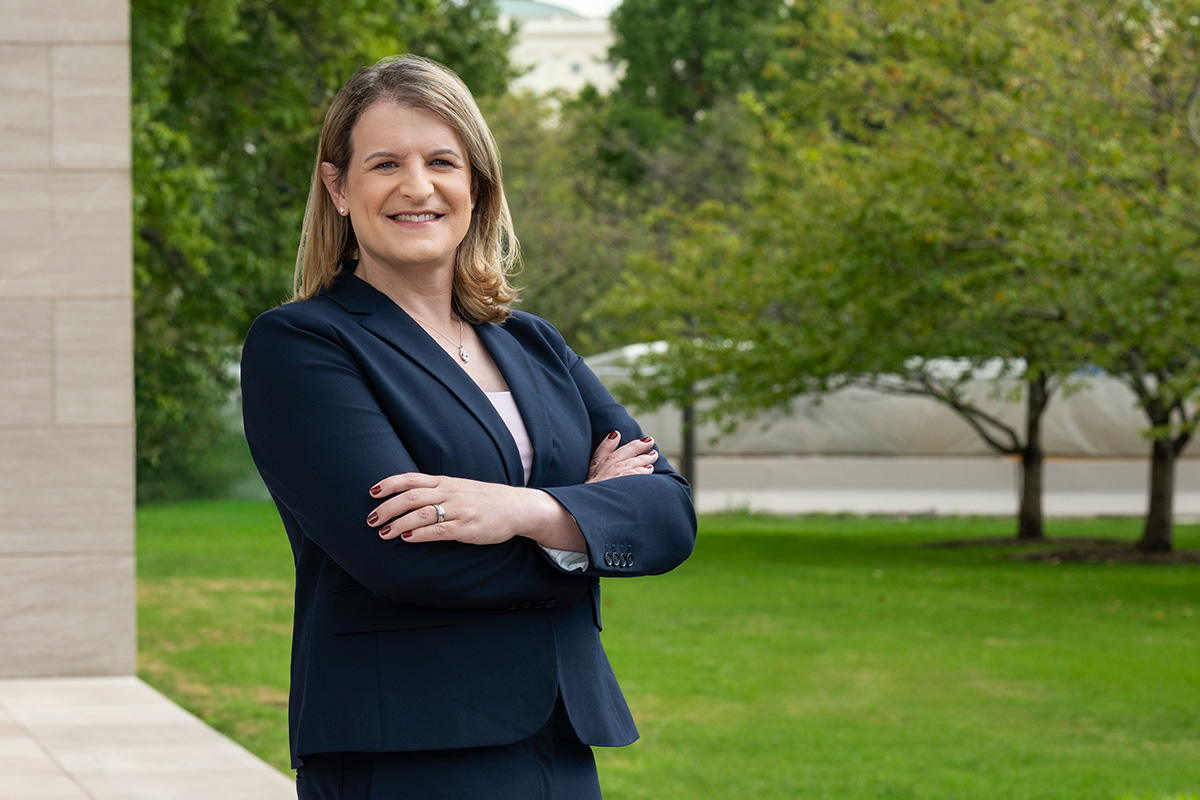
After being ousted from military service, Col. Bree Fram — once the highest-ranking openly transgender officer in the Pentagon — is now running for Congress.
Fram, who lives in Reston, Va., brings more than two decades of public service to her campaign. From the battlefield to the halls of the Pentagon, she spent more than 20 years working inside the federal government, often advocating for LGBTQ people and other marginalized communities from within the system.
Fram spoke with the Washington Blade about her decision to run amid sustained attacks against her — and against the LGBTQ community more broadly — from the Trump-Vance administration and far-right officials.
She said her commitment to public service began more than 22 years ago, shaped in large part by watching the Sept. 11, 2001, terrorist attacks.
“I had grown up expecting that there was this beautiful American peace stretching into the world for the foreseeable future, and that kind of image was shattered,” Fram told the Blade. “I realized that there was a continuous price to be paid to protect our democracy, to protect our freedoms. To be able to play a small part in defending those freedoms was incredibly important to me — to be part of something larger than myself.”

Commissioned through the U.S. Air Force Officer Training School in 2003, Fram served as an astronautical engineer and rose to the rank of colonel in the U.S. Air Force before later serving in the U.S. Space Force. She remained on active duty until 2025, when she was forced out following the Trump-Vance administration’s reinstated ban on trans military service.
Fram has been married for 20 years to her spouse, Peg Fram, and they have two children.
Beyond her military service, Fram has long been involved in advocacy and leadership. She has been a member of SPARTA, a trans military advocacy organization, since 2014, served on its board of directors beginning in 2018, and was president of the organization from 2021-2023.
Most recently, Fram served as chief of the Requirements Integration Division at Headquarters, Space Force, and as co-lead of the Joint Space Requirements Integration Cell in collaboration with the Joint Staff. Previously, she was chief of the Acquisition Policies and Processes Division for the assistant secretary of the Air Force for space acquisition and integration.
Earlier in her career, Fram served as a materiel leader at the Air Force Research Laboratory, overseeing the development of counter-small unmanned aerial systems and offensive cyberspace technologies in support of Pentagon and intelligence community priorities, managing an annual budget exceeding $100 million.
Her previous assignments also included oversight of Air Force security cooperation in four strategically significant Middle Eastern countries and 258 foreign military sales cases valued at $15.79 billion; serving as executive officer to the Air Force director of strategic plans, where she helped integrate the 30-year, $3.6 trillion Air Force Plan; a legislative fellowship on Capitol Hill with then-U.S. Del. Madeleine Bordallo (D-Guam), handling military, veterans, and foreign affairs issues; and a program management role at the National Reconnaissance Office, where she led a $700 million multi-agency engineering and IT contract overseeing more than 500 personnel and supporting $40 billion in assets.
Fram also directed 24/7 worldwide operations and maintenance of mission data processing for space-based and airborne national intelligence assets and co-led the Department of the Air Force’s LGBTQ+ Initiatives Team and Barrier Analysis Working Group from 2023-2025.
She holds a master’s degree from the Air Force Institute of Technology and is a distinguished graduate of the Naval War College. Fram deployed in support of Operation Iraqi Freedom, where she worked on airborne counter-improvised explosive device technologies.
In January, Fram, alongside four other trans military officers, was given a special retirement ceremony by the Human Rights Campaign — a direct result of President Donald Trump’s 2025 Executive Order 14183, titled “Prioritizing Military Excellence and Readiness.” The policy directed the Pentagon to adopt measures prohibiting trans, nonbinary, and gender-nonconforming people from serving in the military.
Under Virginia’s current congressional maps, Fram would challenge Congressman James Walkinshaw in a Democratic primary in the 11th Congressional District, which includes the city of Fairfax and most of Fairfax County. However, the district’s boundaries could change pending ongoing redistricting discussions in the state.
Fram emphasized that her decades working within the executive branch shaped her understanding of what it means to take — and uphold — an oath to the Constitution, even when those in power later forced her out of service solely because of her identity, not her performance.
“Through 23 years of service, I learned what it meant to fulfill that oath to the Constitution, and I wanted to continue serving,” she said. “But when this administration came in and labeled me and others like me ‘dishonorable’ and ‘disciplined liars who lack the humility required for military service,’ it hit hard. When the Supreme Court then agreed to let the administration fire all of us, I had to figure out what would allow me to continue my service in a way that was meaningful and lived up to that oath.”
After being told she would have to retire from a career she describes as her life’s calling, Fram said she began searching for another way to serve — a path that ultimately led her to run for Congress.
“I had done the work over the past couple of decades to understand the America that I believe in, that America I believe we all can be,” Fram said. “That’s where this decision came from. I believe I can fight back and fight forward for Virginians — with the knowledge I have and with a vision of the America we can be.”
That vision, she said, is one that has yet to be fully realized — despite decades of promises from Democratic leaders across all branches of government.
“This is about protecting our fundamental rights — freedom of speech, freedom to assemble, bodily autonomy, a woman’s right to choose, and the ability for queer people to live our best lives,” Fram said. “Right now, our government is throwing barriers up in front of many people. They’re strengthening them, building walls higher, and actively damaging lives.”
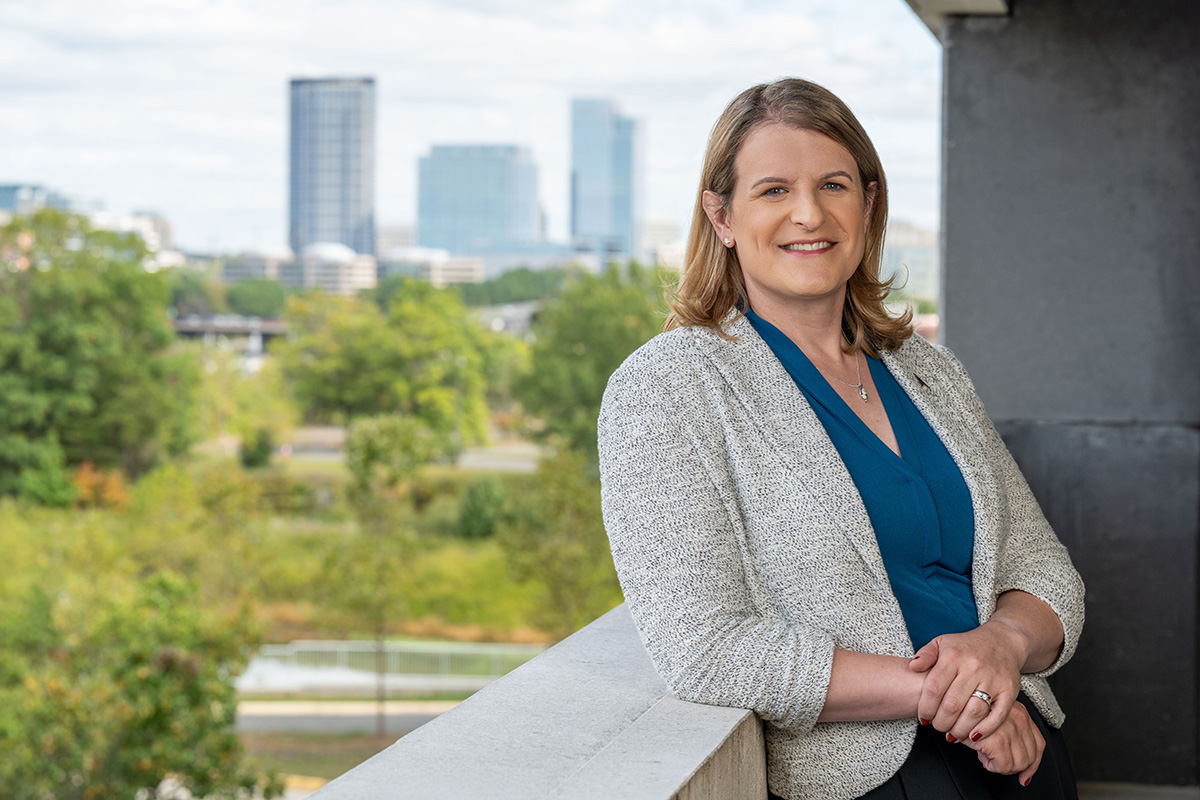
Fram said her leadership philosophy was shaped by watching strong, effective leaders during her time in the Air Force and Space Force — leaders who reinforced her belief that true leadership means expanding opportunity, not restricting it.
“Leadership is about tearing barriers down — not climbing over them and forcing others to suffer through the same things,” she said. “It’s about making sure the people coming up behind us have even more opportunity to go further, faster. How do we be better tomorrow than we are today? How do we fulfill our founding promise of life, liberty, and the pursuit of happiness?”
One way Fram said Congress could help dismantle those barriers is by passing the Equal Rights Amendment, enshrining constitutional protections for all people — particularly LGBTQ Americans.
“Getting the Equal Rights Amendment into the Constitution is absolutely critical to the future of queer rights,” she said. “Voting rights must also be clearly protected.”
Protecting democracy itself is also among her top priorities, Fram said.
“We need to take control of the House so we can put real checks on this administration,” she said. “That allows the American people to see how this administration is actively making their lives worse and less affordable — and it’s how we ultimately throw them out and get back to making life better.”
Fram said her experience working under four presidents — including during Trump’s first term — reinforced her belief that opposition to efforts curtailing civil liberties is essential.
“The primary thing we can do to protect democracy is to get rid of this administration,” she said. “Taking control of the House gives us true investigative power. Under every rock, there is likely an impeachable offense because they are failing to faithfully execute the laws of the United States.”
For her, the message Trump is sending is clear — he and others close-minded to the LGBTQ community are threatened by the possibility of what someone truly dedicated to service can become.
“One of the reasons this administration had to throw us out and silence us was because we were an example of what was possible. We shined so brightly by meeting or exceeding every standard that they couldn’t hide us away by any other means except kicking us out.”
Fram acknowledged that her identity has been a political target since 2016, but said those attacks have never been grounded in her ability to lead or accomplish complex missions over more than two decades of service.
“If others want to attack me on my identity, I welcome it,” she said. “I’m focused on whether people can afford groceries or feel safe in their communities.”
“I’m happy to be a lightning rod for those kinds of attacks,” she added. “If it allows Democrats to advance an agenda that makes life better for Americans, they can come after me all day long. They attacked me while I was in the military, before I was ever running for office.”
On policy, Fram said affordability, health care, and safety are at the center of her agenda.
“No one should be afraid to go to the doctor or fear surprise medical bills that put them into debt,” she said. “Every American deserves access to affordable, high-quality health care.”
She also emphasized a willingness to work across party lines — even with those who previously politicized her identity — if it means delivering results for constituents.
“If someone wants to work together to make people’s lives better, I’ll work with them,” she said. “If they want to come after me based on who I am, they can waste their energy on that.”
Asked how she defines hope in the current political moment, Fram rejected the idea of passive optimism.
“Hope isn’t naive optimism,” she said. “Hope is doing the work — engaging people and bending the moral arc of the universe toward justice.”
She added that representation itself can be transformative.
“Just being in Congress changes the narrative,” Fram said. “It lets a kid say, ‘Oh my God — I could do that too.’”
District of Columbia
Eleanor Holmes Norton ends 2026 reelection campaign
Longtime LGBTQ rights supporter introduced, backed LGBTQ-supportive legislation
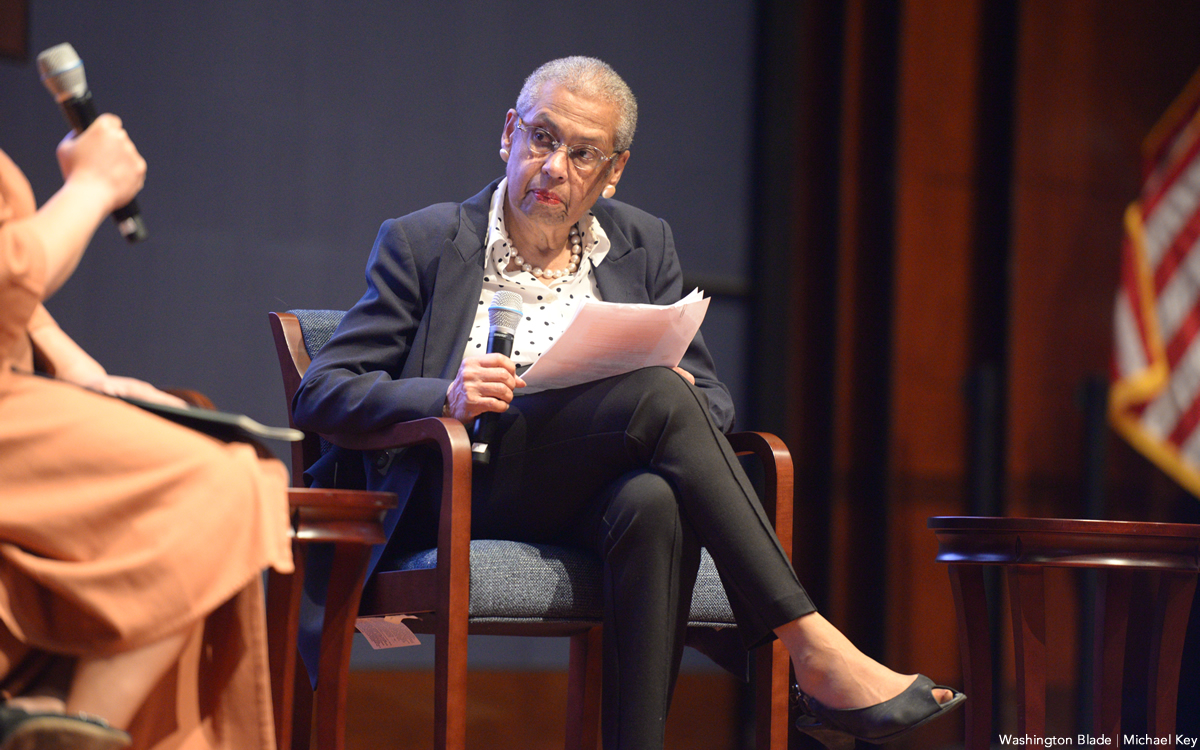
The reelection campaign for D.C. Congressional Delegate Eleanor Holmes Norton, who has been an outspoken supporter of LGBTQ rights since first taking office in 1991, filed a termination report on Jan. 25 with the Federal Elections Commission, indicating she will not run for a 19th term in the U.S. House of Representatives.
Norton’s decision not to run again, which was first reported by the online news publication NOTUS, comes at a time when many of her longtime supporters questioned her ability to continue in office at the age of 88.
NOTUS cited local political observers who pointed out that Norton has in the past year or two curtailed public appearances and, according to critics, has not taken sufficient action to oppose efforts by the Trump-Vance administration and Republican members of Congress to curtail D.C.’s limited home rule government.
Those same critics, however, have praised Norton for her 35-year tenure as the city’s non-voting delegate in the House and as a champion for a wide range of issues of interest to D.C. LGBTQ rights advocates have also praised her longstanding support for LGBTQ rights issues both locally and nationally.
D.C. gay Democratic Party activist Cartwright Moore, who has worked on Norton’s congressional staff from the time she first took office in 1991 until his retirement in 2021, points out that Norton’s role as a staunch LGBTQ ally dates back to the 1970s when she served as head of the New York City Commission on Human Rights.
“The congresswoman is a great person,” Moore told the Washington Blade in recounting his 30 years working on her staff, most recently as senior case worker dealing with local constituent issues.
Norton has been among the lead co-sponsors and outspoken supporters of LGBTQ rights legislation introduced in Congress since first taking office, including the currently pending Equality Act, which would ban employment discrimination based on sexual orientation and gender identity.
She has introduced multiple LGBTQ supportive bills, including her most recent bill introduced in June 2025, the District of Columbia Local Juror Non-Discrimination Act, which would ban D.C. residents from being disqualified from jury service in D.C. Superior Court based on their sexual orientation or gender identity.
For many years, Norton has marched in the city’s annual Pride parade.
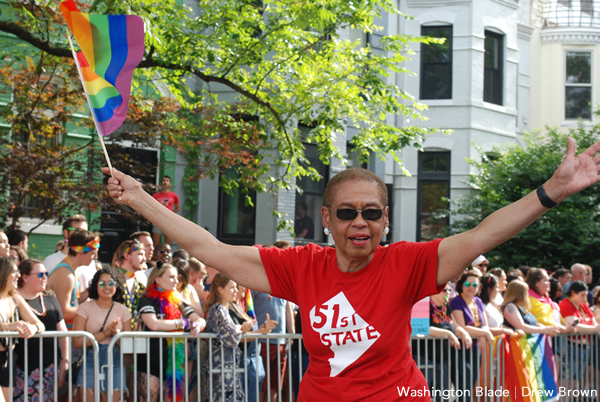
Her decision not to run for another term in office also comes at a time when, for the first time in many years, several prominent candidates emerged to run against her in the June 2026 D.C. Democratic primary. Among them are D.C. Council members Robert White (D-At-Large) and Brooke Pinto (D-Ward 2).
Others who have announced their candidacy for Norton’s seat include Jacque Patterson, president of the D.C. State Board of Education; Kinney Zalesne, a local Democratic party activist; and Trent Holbrook, who until recently served as Norton’s senior legislative counsel.
“For more than three decades, Congresswoman Norton has been Washington, D.C.’s steadfast warrior on Capitol Hill, a relentless advocate for our city’s right to self-determination, full democracy, and statehood,” said Oye Owolewa, the city’s elected U.S. shadow representative in a statement. “At every pivotal moment, she has stood firm on behalf of D.C. residents, never wavering in her pursuit of justice, equity, and meaningful representation for a city too often denied its rightful voice,” he said.
A spokesperson for Norton’s soon-to-close re-election campaign couldn’t immediately be reached for a comment by Norton on her decision not to seek another term in office.



















